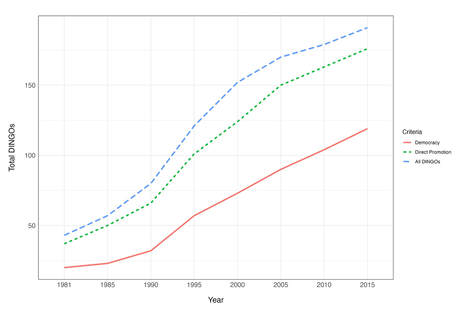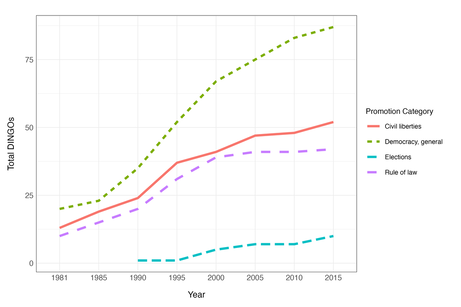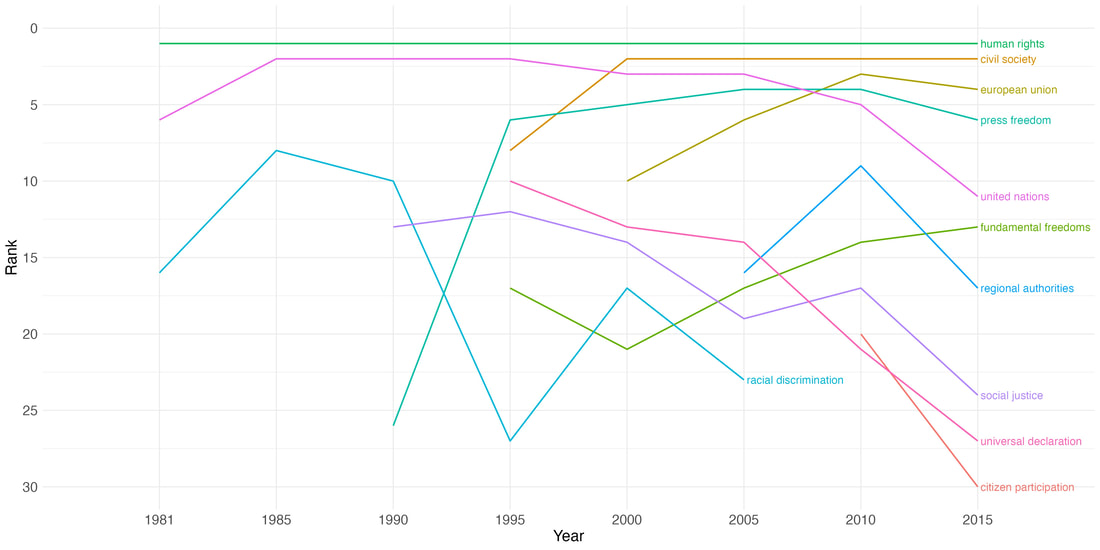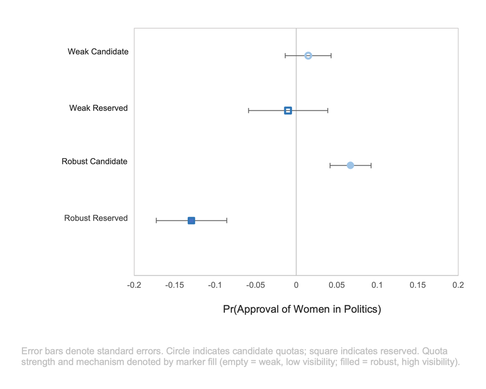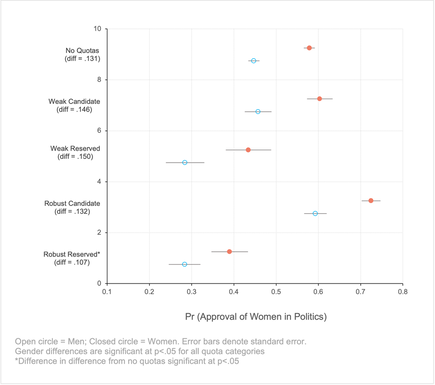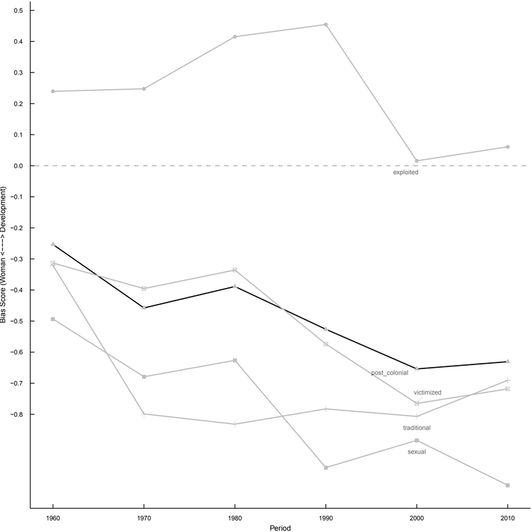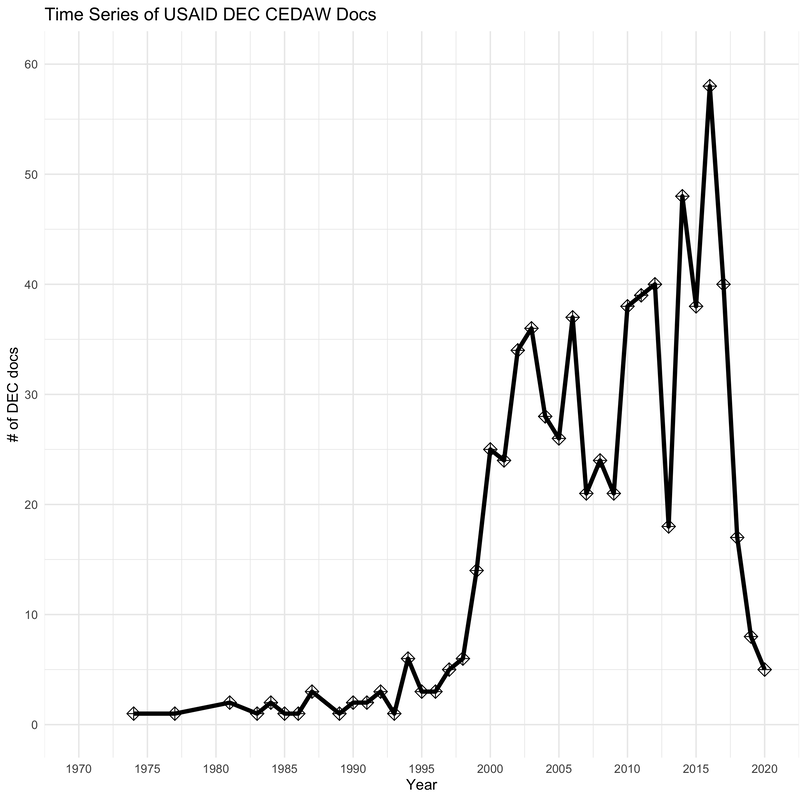research
current projects
1. DINGOs and democracy promotion
|
I. The DINGO Dataset: The Growth, Objectives, and Linkages of Democracy-Promoting International Nongovernmental Organizations
As the Cold War neared its end and democracy became the prevailing model of legitimate government worldwide, global democracy promotion efforts skyrocketed. Since this time, countless studies have illuminated our understanding of the democracy establishment--from strategies and goals, to successes and failures. However, this literature is incomplete in one critical way: because most scholars focus on governmental actors, the presence, attributes, and strategies of global civil society actors working in this space, including democracy-promoting international non-governmental organizations, or DINGOs, has not, until this point, been systematically documented or studied. Made possible through a generous Doctoral Dissertation Research Improvement Grant (DDRIG) from the NSF, the DINGO dataset fills this gap, tracking the emergence and trajectory of active democracy-promoting international nongovernmental organizations (DINGOs) from 1981 to 2015. Collected from physical volumes of the Yearbook of International Organizations (YIO) published by the Union of International Associations (UIA) in five-year increments, the DINGO dataset provides historical snapshots of the DINGO field over a key period of international democracy promotion. Country memberships, organizational attributes, and reported aims and activities are collected for each DINGO, which are classified in several different ways based different inclusion criteria and categorical designations. Descriptive analyses suggest that DINGOs have exponentially increased over the period of analysis--from less than 50 to nearly 200 organizations around the world between 1981 and 2015. Variability emerges when trends are disaggregated by category (elections, civil liberties, rule of law, general democracy) of democracy promotion--coded based on organizational aims. The DINGO dataset will soon be publicly available! |
DINGO Growth, 1981-2015.
DINGO Growth by Promotion Category
|
II. The Origins of Decoupling: Evaluating Democracy-Promoting INGO Objectives
Diving deeper into the rich information provided by the DINGO dataset, this project explores trends in the objectives set forth by DINGOs and their emergent thematic patterns that emerge from
espite its increased prioritization over the past several decades, democracy remains an elusive feat for many nations. This is due, in part, to a recent uptick in hybrid regimes, which possess qualities of both democracy and authoritarianism simultaneously. Among others, one especially salient explanation for hybrid formation is democracy aid itself, which often engenders superficial democratization while masking ongoing authoritarian practices. Still, despite considerable research examining how various factors – including aid – impact hybrid regimes, relatively little headway has been made. This is due primarily to continued disagreement over how to best measure and situate hybrids within the broader democracy literature. In this review, I demonstrate the role sociology can play in addressing this issue while advancing research on democracy, hybrids, and aid in a productive way. I argue that using sociological theories explaining the spread of global norms – such as democracy – to analyze hybrid regimes will facilitate improved understanding of democracy and the factors which shape it across the social sciences.
Diving deeper into the rich information provided by the DINGO dataset, this project explores trends in the objectives set forth by DINGOs and their emergent thematic patterns that emerge from
espite its increased prioritization over the past several decades, democracy remains an elusive feat for many nations. This is due, in part, to a recent uptick in hybrid regimes, which possess qualities of both democracy and authoritarianism simultaneously. Among others, one especially salient explanation for hybrid formation is democracy aid itself, which often engenders superficial democratization while masking ongoing authoritarian practices. Still, despite considerable research examining how various factors – including aid – impact hybrid regimes, relatively little headway has been made. This is due primarily to continued disagreement over how to best measure and situate hybrids within the broader democracy literature. In this review, I demonstrate the role sociology can play in addressing this issue while advancing research on democracy, hybrids, and aid in a productive way. I argue that using sociological theories explaining the spread of global norms – such as democracy – to analyze hybrid regimes will facilitate improved understanding of democracy and the factors which shape it across the social sciences.
III. DINGO Networks
INSERT
INSERT
IV. DINGO Linkages, Hybrid Regimes, and Democratization
Despite its increased prioritization over the past several decades, democracy remains an elusive feat for many nations. This is due, in part, to a recent uptick in hybrid regimes, which possess qualities of both democracy and authoritarianism simultaneously. Among others, one especially salient explanation for hybrid formation is democracy aid itself, which often engenders superficial democratization while masking ongoing authoritarian practices. Still, despite considerable research examining how various factors – including aid – impact hybrid regimes, relatively little headway has been made. This is due primarily to continued disagreement over how to best measure and situate hybrids within the broader democracy literature. In this review, I demonstrate the role sociology can play in addressing this issue while advancing research on democracy, hybrids, and aid in a productive way. I argue that using sociological theories explaining the spread of global norms – such as democracy – to analyze hybrid regimes will facilitate improved understanding of democracy and the factors which shape it across the social sciences.
Despite its increased prioritization over the past several decades, democracy remains an elusive feat for many nations. This is due, in part, to a recent uptick in hybrid regimes, which possess qualities of both democracy and authoritarianism simultaneously. Among others, one especially salient explanation for hybrid formation is democracy aid itself, which often engenders superficial democratization while masking ongoing authoritarian practices. Still, despite considerable research examining how various factors – including aid – impact hybrid regimes, relatively little headway has been made. This is due primarily to continued disagreement over how to best measure and situate hybrids within the broader democracy literature. In this review, I demonstrate the role sociology can play in addressing this issue while advancing research on democracy, hybrids, and aid in a productive way. I argue that using sociological theories explaining the spread of global norms – such as democracy – to analyze hybrid regimes will facilitate improved understanding of democracy and the factors which shape it across the social sciences.
2. environmental AND climate change beliefs, emotions, and action
Throughout summer 2023, climate records have continued to shatter, as average global temperatures reach unprecedented levels. Yet, climate change skepticism and denial persist. For instance, approximately one third of individuals around the world surveyed by the International Social Survey Program agree that "claims about the environment have been exaggerated." What shapes these beliefs? Currently, a wealth of research identifies micro-level determinants of environmental and climate skepticism, including gender, political ideology, race, and education. Others identify these sentiments as a symptom of illiberal anti-globalization populist backlash manifesting in response to global economic downturns and the uncertainty, unemployment, and financial precarity they engender. Yet what remains to be seen is how macro-level global factors, particularly those of a cultural nature, bolster or reduce such beliefs. Broadly conceived, this project explores the determinants and consequences of environmental and climate attitudes-both liberal (i.e., pro-environmental) and illiberal (i.e., climate change skepticism)-from a global perspective. Drawing upon a world society framework, I explore how integration into the liberal world order shapes individuals' beliefs, emotions, and actions across several interrelated papers.
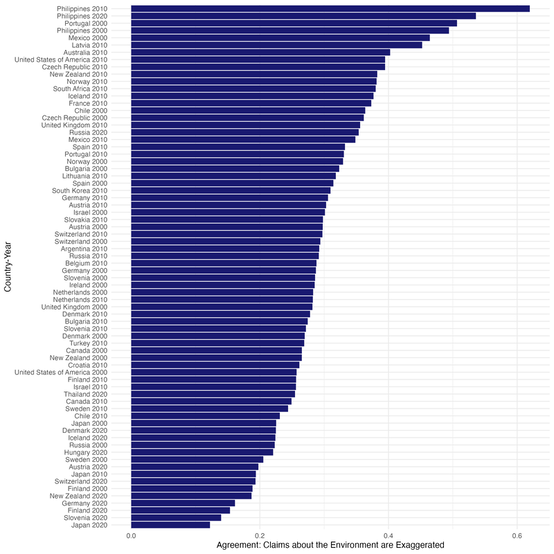
I. Inhibiting or Contributing? How Global Cultural Forces Impact Environmental and Climate Change Skepticism
...
Drawing upon existing data collected by the International Social Survey Program (ISSP) evaluating environmental and climate beliefs worldwide, this paper explores
Our first project draws upon existing data collected by the International Social Survey Program (ISSP) which evaluates environmental and climate beliefs worldwide. Using this data, we gain a preliminary sense of the state of environmental beliefs cross-nationally and over time—particularly climate skepticism—while examining the factors which shape them. Although many scholars explore pro-environmental attitudes and their global determinants, as well as the psychological and micro-level predictors of anti-climate change beliefs, few examine how global factors, particularly those of a cultural origin, shape climate change skepticism and denial.
In pursuing this project, we have already completed one paper (currently a WZB preprint reviewed internally by İrem Tuncer-Ebetürk (GG), and under review at American Sociological Review), and find that 1) embeddedness within liberal world society is linked to reduced skepticism, but 2) these effects vary when liberal and illiberal forces interact—a phenomenon we refer to as cultural dissonance. At the national level, in authoritarian regimes, people are amenable to the influence of liberal actors on their climate beliefs; however, at the individual level, right-wing respondents remain skeptical regardless of liberal embeddedness. Additionally, we are also in the process of developing a second paper, which finds that liberal embeddedness is also linked to less distrust in government, scientists, universities. Although this paper does not examine climate skepticism directly, by exploring distrust in elite institutions—a key predictor of populist attitudes, including climate skepticism—it lays the groundwork for exploring the link between populism, trust in science, and climate skepticism in our next major project.
...
Drawing upon existing data collected by the International Social Survey Program (ISSP) evaluating environmental and climate beliefs worldwide, this paper explores
Our first project draws upon existing data collected by the International Social Survey Program (ISSP) which evaluates environmental and climate beliefs worldwide. Using this data, we gain a preliminary sense of the state of environmental beliefs cross-nationally and over time—particularly climate skepticism—while examining the factors which shape them. Although many scholars explore pro-environmental attitudes and their global determinants, as well as the psychological and micro-level predictors of anti-climate change beliefs, few examine how global factors, particularly those of a cultural origin, shape climate change skepticism and denial.
In pursuing this project, we have already completed one paper (currently a WZB preprint reviewed internally by İrem Tuncer-Ebetürk (GG), and under review at American Sociological Review), and find that 1) embeddedness within liberal world society is linked to reduced skepticism, but 2) these effects vary when liberal and illiberal forces interact—a phenomenon we refer to as cultural dissonance. At the national level, in authoritarian regimes, people are amenable to the influence of liberal actors on their climate beliefs; however, at the individual level, right-wing respondents remain skeptical regardless of liberal embeddedness. Additionally, we are also in the process of developing a second paper, which finds that liberal embeddedness is also linked to less distrust in government, scientists, universities. Although this paper does not examine climate skepticism directly, by exploring distrust in elite institutions—a key predictor of populist attitudes, including climate skepticism—it lays the groundwork for exploring the link between populism, trust in science, and climate skepticism in our next major project.
II. Experimental Survey in Philippines
INSERT DESCRIPTION
INSERT DESCRIPTION
III. Climate Emotions and Action
Building on the agenda established by the previous two, this project develops a new framework for thinking about climate beliefs manifesting as emotions, and explores how these emotions shape not only micro-level actions (e.g, recycling, reduced travel), but also, broader life-course decisions (e.g., migration, reproduction). Using an original, comparative cross-national survey to be fielded across eight different nations, my coauthors and I explore how exposure to prevailing liberal environmental norms and populist counter-environmental discourse shapes these outcomes. In doing so, we merge the existing literature on emotions in psychology and environmental action in political science to develop a sociological theory of climate emotions.
In executing this project, we will first examine how linkages to liberal world society shapes climate emotions, including climate anxiety, depression, optimism, hostility, and anger at both the micro (e.g., unease about the effects environmental degradation and climate change will have on oneself and one's family) and macro levels (e.g., unease about the effects environmental degradation and climate change will have on the world and society at large). Based on these findings, this project will then explore how different types and levels of climate emotions shape individual climate action regarding two understudied but highly salient life-course decisions: migration (e.g., moving somewhere experiencing lower climate risk) and reproduction (e.g., having fewer children). Findings will illustrate which level and types of climate emotions facilitate which types of behaviors, and in doing so, offering new insights about the ways in which exposure to (il)liberal narratives shape individuals' disposition and resultant behaviors.
Building on the agenda established by the previous two, this project develops a new framework for thinking about climate beliefs manifesting as emotions, and explores how these emotions shape not only micro-level actions (e.g, recycling, reduced travel), but also, broader life-course decisions (e.g., migration, reproduction). Using an original, comparative cross-national survey to be fielded across eight different nations, my coauthors and I explore how exposure to prevailing liberal environmental norms and populist counter-environmental discourse shapes these outcomes. In doing so, we merge the existing literature on emotions in psychology and environmental action in political science to develop a sociological theory of climate emotions.
In executing this project, we will first examine how linkages to liberal world society shapes climate emotions, including climate anxiety, depression, optimism, hostility, and anger at both the micro (e.g., unease about the effects environmental degradation and climate change will have on oneself and one's family) and macro levels (e.g., unease about the effects environmental degradation and climate change will have on the world and society at large). Based on these findings, this project will then explore how different types and levels of climate emotions shape individual climate action regarding two understudied but highly salient life-course decisions: migration (e.g., moving somewhere experiencing lower climate risk) and reproduction (e.g., having fewer children). Findings will illustrate which level and types of climate emotions facilitate which types of behaviors, and in doing so, offering new insights about the ways in which exposure to (il)liberal narratives shape individuals' disposition and resultant behaviors.
3. Development and women's rights
Quotas and Attitudes towards Women
INSERT DESCRIPTION
INSERT DESCRIPTION
USAID Gender and Development Policies
INSERT EXPLANATIONS
INSERT EXPLANATIONS
ICT Use, Empowerment, and Exploitation
Despite its INSERT
Despite its INSERT
